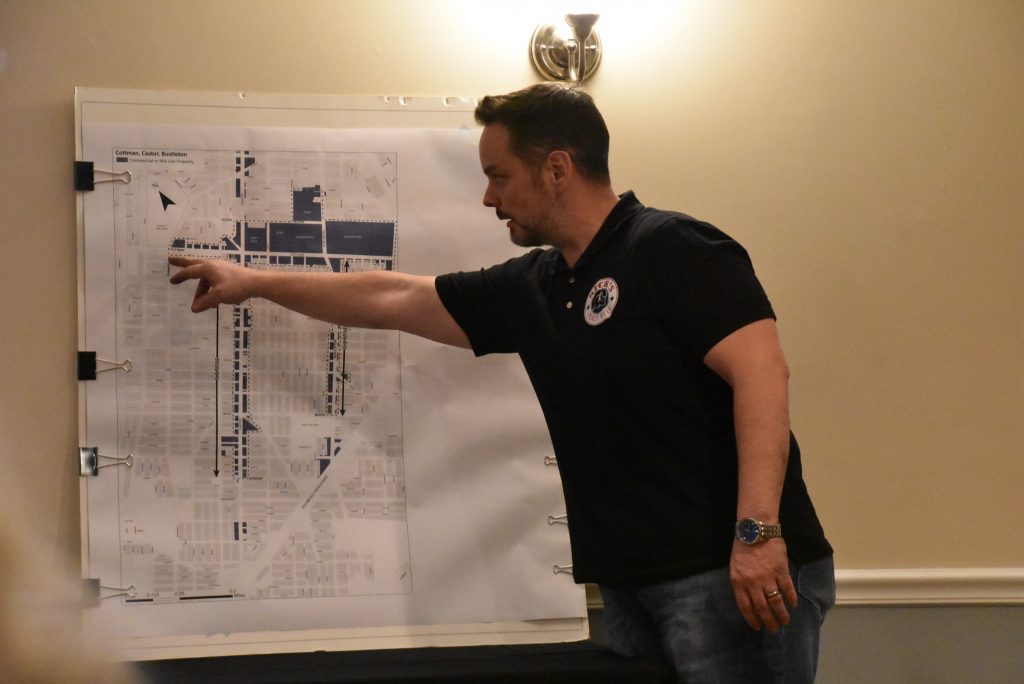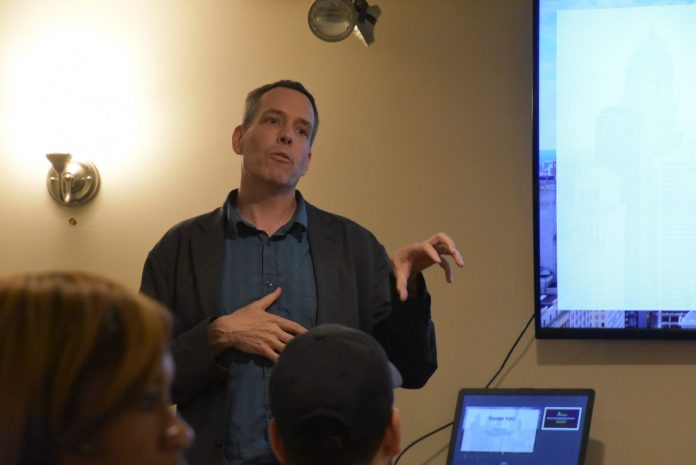A new organization aimed at improving and promoting commercial corridors and funded by a levy on businesses could be coming to the Castor Gardens area.
Last week, the Castor, Cottman & Bustleton Business Association began exploring the idea of creating a Business Improvement District.
A BID is a designated area where commercial property owners pay a mandatory fee, and the money goes toward paying for additional services, as determined by the businesses themselves. BIDs have been known to hire cleanup crews, pay for private security and beautify streets with planters and banners.
Currently, there are 13 BIDs in the city, and the only one in the Northeast is located in Mayfair.
Nick’s Roast Beef owner Matt Rossi, the business association’s president, said he has seen the success of the districts in other neighborhoods and believes it could work for the area, which includes larger shopping centers like the Roosevelt Mall and small storefronts.
“To me, it was a natural step to at least really look into and determine if it was feasible for our little corner of the city,” Rossi said during the meeting.
Rossi worked with the Commerce Department to draw up a tentative map of the district.
It included Cottman Avenue from Summerdale Avenue to Roosevelt Boulevard, Castor Avenue from Bleigh Avenue to Robbins Avenue and Bustleton Avenue from Oakmont Street to Magee Avenue.
“This is proposed. It may not go anywhere,” Rossi said, adding that the business community may want to alter the boundaries if the decision is made to go forward with the district.
The April 29 meeting included a presentation from the Commerce Department, a conversation with representatives from the Mayfair BID and a lengthy discussion about how the districts work and what benefits they can bring.
Starting a BID is not a quick process. It normally takes 18 to 24 months and requires the formation of a steering committee, a survey of business owners, a formal BID plan and a bill passed in City Council.
“It’s been difficult to form a business improvement district,” said Denis Murphy, the Commerce Department’s director of corridor development.
A recent attempt to create a BID along South 9th Street in the Italian Market area failed due to opposition by some property owners, Murphy said.
If more than a third of property owners — as determined by either value or number of properties — object to the proposal, a BID cannot be formed, according to Murphy.
He said BIDs should normally have a core of at least 10 business owners who want to be heavily involved in the organization. BIDs should also be able to raise a budget of no less than $150,000 or it’s not worth it, Murphy said.
Property owners do not pay a flat fee to the BID. Rather, the levy varies and is determined by the city’s tax assessment of a particular property. Larger and more valuable properties, therefore, pay much more than small stores.
Getting the shopping center operators on the north side of Cottman Avenue to sign on may be a key to forming the proposed BID, since the Roosevelt Mall is assessed at $28.7 million and the Great Northeast Plaza, home to the shuttered Sears, is valued at $32.4 million.
By comparison, a smaller business like Lee’s Hoagie House at 7328 Castor Ave. carries an assessment of about $360,000.
Rossi said he has not yet discussed the BID idea with Brixmor Property Group, which owns the mall, and Kimco Realty, owner of GNP, the Cottman & Castor Shopping Center and the Target shopping center.
Brixmor, in a statement to the Times, didn’t commit to supporting or opposing a potential BID.
“We are committed to the long-term success and relevance of Roosevelt Mall to customers and the community,” said Ryan Guheen, the company’s senior vice president of redevelopment and development. “We welcome and look forward to discussing ideas and proposals to make improvements.”
Kimco declined to comment for this article.

The benefits of a BID can be substantial. Murphy said the district gives a business community “stable funding” to get things done, while business associations typically rely solely on grants and donations.
Grey Lodge Pub owner Mike “Scoats” Scotese, chairman of the Mayfair BID, said the organization has made a real difference in the neighborhood since it was formed four years ago.
“We’re really killing it,” Scotese said at the meeting. “I definitely think the perception of the neighborhood has changed a lot for the better.”
The Mayfair BID spans Frankford Avenue between Harbison and Sheffield avenues and also includes small parts of Cottman and Robbins Street.
Executive Director Marc Collazzo said the group has cleaned Frankford Avenue, installed security cameras at six intersections, launched a marketing campaign and hosted special events like Eagles pregame radio shows. Recently, the Mayfair BID opened a small theater.
“What you want to do is find what compliments and enhances your community,” Collazzo said.
Business owners at the meeting asked multiple questions, including whether the BID would help their bottom line.
“Obviously, you want to think how does this affect you, but you’re also thinking, in a broader sense, how does this help this entire commercial corridor,” Collazzo said in response. “There is something extra that all of you will get that you’re not going to get otherwise.”
Another questioned whether a BID would just be providing services the city should be doing anyway.
“Is it letting them off the hook?” Rossi said. “No, I think it’s actually going to enhance what we get from the city.” ••






